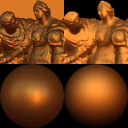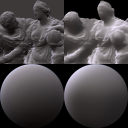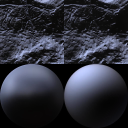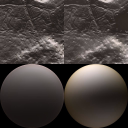This repository presents our data on inverse rendering with light field camera
Paper preprint (PDF) | Visualisation 1 | Visualisation 2 | Visualisation 3 | Visualisation 4
We propose an inverse rendering model for light fields to recover surface normals, depth, reflectance and natural illumination. Our setting is fully uncalibrated, with the reflectance modeled with a spatially-constant Blinn-Phong model and illumination as an environment map. While previous work makes strong assumptions in this difficult scenario, focusing solely on specific types of objects like faces or imposing very strong priors, our approach leverages only the light field structure, where a solution consistent across all subaperture views is sought. The optimization is based primarily on shading, which is sensitive to fine geometric details which are propagated to the initial coarse depth map. Despite the problem being inherently ill-posed, we achieve encouraging results on synthetic as well as real-world data.
All videos show a series of images where the left top image is the input image and ground truth, the right top re-rendered image with the estimated parameters (normals, BRDF and illumination). The left bottom image shows a sphere that is rendered with ground truth illumination and BRDF and the right image shows the same sphere geometry as the right but rendered with estimated BRDF and illumination. Each consecutive frame is rendered with a sliding envmap.
Upon request, better contact me on my personal email sulc.antonin[with]gmail.com
Following links will redirect you to Google Drive archived files.
Description TBD
MD5 c3ce70fcd30497d9e3a9d9c3aa890a40.
MD5 eb3d71f71aa1c4a369e8c30b7bcd31fd.
MD5 aa8580cf2afc65904dfa5891e07cc023.
MD5 6650d1314f21cc43ff800502a388e534.
MD5 928fe87ff11241f7f632e0a770f8786f.



